Good news, GreatExam has updated the 70-410 braindumps. With all the questions and answers in your hands, you will pass the Microsoft 70-410 exam easily. All the 70-410 dumps are updated and cover every aspect of the examination. Welcome to choose.
QUESTION 211
You work as an administrator at L2P.com. The L2P.com network consists of a single domain named L2P.com.
Subsequent to deploying a Server Core Installation of Windows Server 2012 on a new L2P.com server, you are instructed to add a graphical user interface (GUI) to the server.
You want to achieve this goal from the command prompt.
Which of the following actions should you take?
A. You should consider making use of the dism.exe command.
B. You should consider making use of the dsquery.exe command.
C. You should consider making use of the dsadd.exe command.
D. You should consider making use of the dsrm.exe command.
Answer: A
Explanation:
A. Deployment Image Servicing and Management (DISM)
B. dsquery Queries the directory by using search criteria that you specify C. dsadd Adds specific types of objects to the directory.
D. dsrm Deletes an object of a specific type or any general object from the directory.
The Deployment Image Servicing and Management (DISM) tool replaces the pkgmgr, PEImg, and IntlConfg tools that are being retired in Windows 7. DISM provides a single centralized tool for performing all of the functions of these three tools in a more efficient and standardized way, eliminating the source of many of the frustrations experienced by current users of these tools.
Dism /online /enable-feature /featurename:Server-Gui-Mgmt /featurename:Server-Gui-Shell / featurename:ServerCore-FullServer
http://msdn.microsoft.com/en-us/library/windows/desktop/dd371719%28v=vs.85%29.aspx
QUESTION 212
Your network contains two Hyper-V hosts that run Windows Server 2012 R2. The Hyper-V hosts contains several virtual machines that run Windows Server 2012 R2.
You install the Network Load Balancing feature on the virtual machines.
You need to configure the virtual machines to support Network Load Balancing (NLB).
Which virtual machine settings should you configure?
A. Port mirroring
B. DHCP guard
C. Router guard
D. MAC address
Answer: D
Explanation:
http://social.technet.microsoft.com/Forums/windowsserver/en-US/5b3a0a9d-26a2-49ba-bbbe-29d11fcbb7ce/nlb-on-hyperv?forum=winserverhyperv
For NLB to be configured you need to enable MAC address spoofing.
QUESTION 213
Your network contains an Active Directory forest that contains two domains. The forest contains five domain controllers. The domain controllers are configured as shown in the following table.
You need to configure DC5 as a global catalog server.
Which tool should you use?
A. Active Directory Domains and Trusts
B. Active Directory Users and Computers
C. Active Directory Administrative Center
D. Active Directory Sites and Services
Answer: D
Explanation:
If you have more than one domain in your forest and you have a significant user population in a site, you canoptimize the speed and efficiency of domain logons and directory searches by adding a global catalog server tothe site. If you have a single-domain forest, global catalog servers are not required for logons, but directory searchesare directed to the global catalog. In this case, you can enable the global catalog on all domain controllers forfaster directory searches. You can use the same user interface (UI) in the Active Directory Sites and Services snap-in to add or removethe global catalog. Enabling the global catalog can cause additional replication traffic. However, global catalogremoval occurs gradually in the background and does not affect replication or performance. Membership in the Enterprise Admins group in the forest or the Domain Admins group in the forest rootdomain, or equivalent, is the minimum required to complete this procedure. To add or remove the global catalogOpen Active Directory Sites and Services. To open Active Directory Sites and Services, click Start, click Administrative Tools, and then click Active Directory Sites and Services.
To open Active Directory Sites and Services in Windows Server?2012, click Start , type dssite.msc. In the console tree, click the server object to which you want to add the global catalog or from which youwant to remove the global catalog.
Where?
Active Directory Sites and Services\Sites\SiteName\Servers
In the details pane, right-click NTDS Settings of the selected server object, and then click Properties. Select the Global Catalog check box to add the global catalog, or clear the check box to remove theglobal catalog.
Global catalog servers and sites
To optimize network performance in a multiple-site environment, consider adding global catalog servers in sitesaccording to the needs in the sites for fast search responses and domain logons. It is recommended to makeall domain controllers be global catalog severs if possible. In a single-site, multiple-domain environment, asingle global catalog server is usually sufficient to cover common Active Directory queries and logons.
QUESTION 214
You work as an administrator at L2P.com. The L2P.com network consists of a single domain named L2P.com. All servers on the L2P.com network have Windows Server 2012 installed.
You have received instructions to install the Remote Desktop Services server role on a server, named L2P-SR07.
You want to achieve this remotely from a server, named L2P-SR06.
Which of the following actions should you take?
A. You should consider accessing the Server Manager console on L2P-SR07.
B. You should consider accessing the Server Manager console on L2P-SR06.
C. You should consider accessing the TS Manager console on L2P-SR07.
D. You should consider accessing the TS Manager console on L2P-SR06.
Answer: B
Explanation:
Windows Server 2012 delivers capabilities to manage many servers and the devices connecting them, whether they are physical or virtual, on-premises or off. With Windows Server 2012 R2, you can rely on new management capabilities for connecting to multiple machines through a single interface, robust automation to help improve compliance, increasing efficiency through automation and creating unified experiences across physical and virtual platforms.
http://www.microsoft.com/en-us/server-cloud/windows-server/server-management-automation.aspx
http://www.techieshelp.com/windows-server-2012-install-and-configure-remote-desktop-services/ http://technet.microsoft.com/en-us/library/cc742813.aspx
http://technet.microsoft.com/en-us/library/hh831809.aspx
http://technet.microsoft.com/en-us/library/hh831456.aspx
QUESTION 215
Your network contains an Active Directory domain named contoso.com.
The domain contains a server named Server1. Server1 runs Windows Server 2012 R2.
You need to create 3-TB virtual hard disk (VHD) on Server1.
Which tool should you use?
A. File Server Resource Manager (FSRM)
B. New-StoragePool
C. Diskpart
D. Share and Storage Management
Answer: C
Explanation:
Diskpart – “create vdisk file=c:\test.vhd maximum=3000000 type=expandable”
http://www.hyper-v.nu/archives/hvredevoort/2012/01/windows-8-storage-and-hyper-v-part-2-vhdx-andpowershell/
http://www.hyper-v.nu/archives/hvredevoort/2012/04/windows-8-storage-and-hyper-v-part-3-the-art-ofcreating-a-vhd-2/
http://technet.microsoft.com/library/hh831487
QUESTION 216
Your network contains an Active Directory domain named contoso.com.
The domain contains a server named Server1 that runs Windows Server 2012 R2.
You create a new inbound rule by using Windows Firewall with Advanced Security.
You need to configure the rule to allow Server1 to accept unsolicited inbound packets that are received through a network address translation (NAT) device on the network.
Which setting in the rule should you configure?
A. Edge traversal
B. Authorized computers
C. Interface types
D. Remote IP address
Answer: A
Explanation:
Edge traversal – This indicates whether edge traversal is enabled (Yes) or disabled (No). When edge traversalis enabled, the Application, service, or port to which the rule Applies is globally addressable and accessiblefrom outside a network address translation (NAT) or edge device.
Select one of the following options from the list:
Block edge traversal (default) – Prevent Applications from receiving unsolicited traffic from the Internet througha NAT edge device.
Allow edge traversal – Allow Applications to receive unsolicited traffic directly from the Internet through aNAT edge device.
Defer to user – Let the user decide whether to allow unsolicited traffic from the Internet through a NAT edgedevice when an Application requests it.
Defer to Application – Let each Application determine whether to allow unsolicited traffic from the Internetthrough a NAT edge device.
http://technet.microsoft.com/en-us/library/cc731927.aspx
http://technet.microsoft.com/en-us/library/dd421713%28v=ws.10%29.aspx
QUESTION 217
Drag and Drop Question
You have a server named Server1 that runs Windows Server 2012 R2.
You need to create a new volume on Server1.
The new volume must have the following configurations:
– Be stored on a new virtual hard disk
– Be assigned the drive letter G
– Have the NTFS file system
In which order should you run the Diskpart commands? To answer, move all the Diskpart commands from the list of commands to the answer area and arrange them in the correct order.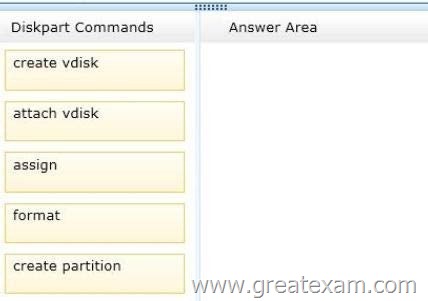
Answer: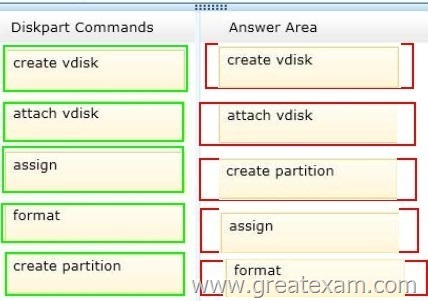
QUESTION 218
Hotspot Question
Your network contains an Active Directory domain named contoso.com. The network contains a DHCP server named DHCP1.
You add a new network segment to the network. On the new network segment, you deploy a new server named Server1 that runs Windows Server 2012 R2.
You need to configure Server1 as a DHCP Relay Agent.
Which server role should you install on Server1? To answer, select the appropriate role in the answer area.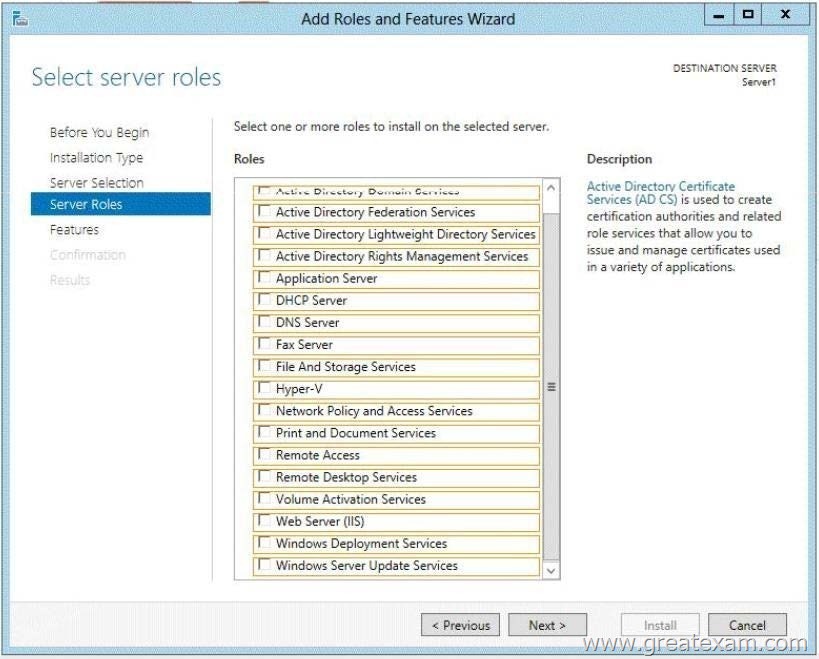
Answer: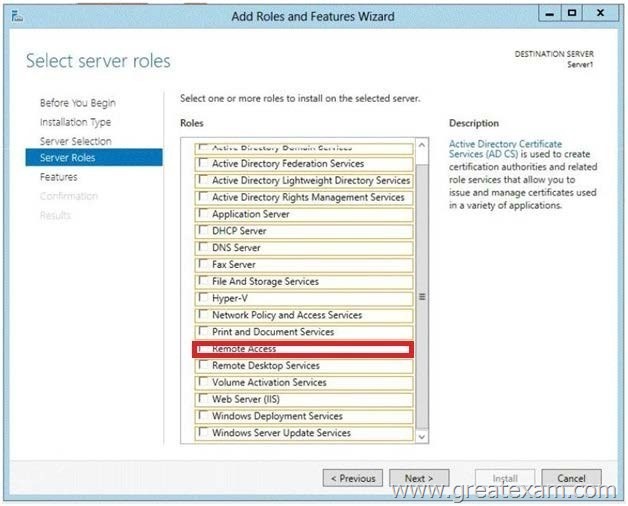
Explanation:
If you opt to create a centralized or hybrid DHCP infrastructure, you will need a DHCP relay agent on every subnet that does not have a DHCP server on it. Many routers are capable of functioning as DHCP relay agents, but in situations where they are not, you can configure a Windows Server 2012 computer to function as a relay agent.
http://my.safaribooksonline.com/book/certification/9780735673151/4dot-deploying-and-configuring-core- network-services/objective_42_configure_servers_html
QUESTION 219
You work as an administrator at L2P.com. The L2P.com network consists of a single domain named L2P.com. All servers on the L2P.com network have Windows Server 2012 installed.
You are in the process of installing a Server Core installation of Windows Server 2012 on a new L2P.com server, named L2P-SR13.
Which of the following is TRUE with regards to a installing a Server Core installation of Windows Server 2012? (Choose all that apply.)
A. The Server Graphical Shell is installed, but not enabled.
B. Server roles can be configured locally via the command prompt using Windows PowerShell.
C. Server roles can be configured locally via Server Manager.
D. You are able to access the Microsoft Management Console locally.
E. The Desktop Experience is not available.
Answer: BE
Explanation:
A. There is no Windows shell and very limited GUI functionality
B. The Server Core interface is a command prompt with PowerShell support.
C. Only Remotely using Server Manager
D. Microsoft Management Console is not available locally
E. Desktop Experience is not available
Server Core is a minimal server installation option for computers running on the operating system. Server Core provides a low-maintenance server environment with limited functionality.
The minimal nature of Server Core creates limitations:
There is no Windows shell and very limited GUI functionality. The Server Core interface is a command prompt with PowerShell support.
There is limited MSI support (unattended mode only).
Server Graphical Shell is not installed
Microsoft Management Console: not available locally.
Desktop Experience: not available.
http://msdn.microsoft.com/en-us/library/windows/desktop/hh846323%28v=vs.85%29.aspx http://technet.microsoft.com/en-us/library/hh831786.aspx
http://technet.microsoft.com/en-us/library/jj574205.aspx
http://technet.microsoft.com/en-us/library/ee441255%28v=ws.10%29.aspx
QUESTION 220
You have a server named Server1 that runs a Server Core installation of Windows Server 2012 R2. Server1 is configured to obtain an IPv4 address by using DHCP.
You need to configure the IPv4 settings of the network connection on Server1 as follows:
– IP address: 10.1.1.1
– Subnet mask: 255.255.240.0
– Default gateway: 10.1.1.254
What should you run?
A. Set-NetlPInterface
B. netcfg.exe
C. New-NetlPAddress
D. msconfig.exe
Answer: C
Explanation:
A. The Set-NetIPInterface cmdlet modifies IP interface properties such as is DHCP, IPv6 neighbor discovery settings, router settings and Wake on LAN (WoL) settings. The NetIPInterface object is automatically created by the computer and thus the NetIPInterface object has no New or Remove verbs.
C. The New-NetIPAddress cmdlet creates IP address and the configuration properties of that IP address. To create a specific IP address object, the required parameters include an IP address (IPv4 or IPv6) and an interface (InterfaceIndex or InterfaceAlias). It is also recommended to define the prefix length, alsoknown as a subnet mask, and default gateway. If DHCP is enabled on the interface to which this cmdlet is configured to, then DHCP will automatically be disabled.
D. System Configuration Utility (Msconfig.exe) automates the routine troubleshooting steps that Microsoft Product Support Services technicians use when diagnosing Windows configuration
issues.
You can use this tool to modify the system configuration through a process of elimination with check boxes, reducing the risk of typing errors.
http://technet.microsoft.com/en-us/library/hh826125(v=wps.620).aspx http://technet.microsoft.com/en-us/library/hh826150%28v=wps.620%29.aspx http://windows.microsoft.com/en-us/windows7/change-tcp-ip-settings
QUESTION 221
Your network contains an Active Directory domain named adatum.com.
The domain contains the servers shown in the following table.
You need to ensure that you can use Server Manager on DC1 to manage DC2.
Which two tasks should you perform? (Each correct answer presents part of the solution.
Choose two.)
A. Install Microsoft .NET Framework 4 on DC2.
B. Install Remote Server Administration Tools on DC1.
C. Install the Windows PowerShell 2.0 engine on DC1.
D. Install Remote Server Administration Tools on DC2.
E. Install Windows Management Framework 3.0 on DC2.
Answer: AE
Explanation:
In Windows Server 2012 R2, you can use Server Manager to perform management tasks on remote servers. Remote management is enabled by default on servers that are running Windows Server 2012 R2. To manage a server remotely by using Server Manager, you add the server to the Server Manager server pool. You can use Server Manager to manage remote servers that are running Windows Server 2008 and Windows Server 2008 R2, but the following updates are required to fully manage these older operating systems.
Windows Management Framework 3.0 To use this release of Server Manager to access and manage remote servers that are running Windows Server 2008 or Windows Server 2008 R2, you must first install .NET Framework 4.0, and then install Windows Management Framework 3.0 on those servers.
QUESTION 222
You have a file server named Server1 that runs Windows Server 2012 R2.
Server1 contains a folder named Folder1.
You share Folder1 as Share1 by using Advanced Sharing. Access-based enumeration is enabled. Share1 contains an application named Appl.exe.
You configure the NTFS permissions on Folder1 as shown in the following table.
The members of Group2 report that they cannot make changes to the files in Share1.
The members of Group1 and Group2 run Appl.exe successfully.
You need to ensure that the members of Group2 can edit the files in Share1.
What should you do?
A. Edit the Share permissions.
B. Disable access-based enumeration.
C. Replace the NTFS permissions on all of the child objects.
D. Edit the NTFS permissions.
Answer: A
Explanation:
Suppose you’ve shared a folder on a Windows Server 2012 R2 system and you’ve created the share as a readonlyshare, but the NTFS permissions for the folder are Full Control for the Everyone group. When conflicts likethis arise between share and NTFS permissions, the most restrictive permission set wins out.
There are a number of additional settings that you can enable for the share. ABE allows users to see just thefiles and folders to which they have been granted access and not even be able to see that other itemsexist.
http://blogs.technet.com/b/keithmayer/archive/2012/10/21/ntfs-shared-folders-a-whole-loteasier- in-windowsserver-2012.aspx
http://www.techrepublic.com/blog/networking/how-to-share-a-folder-in-windows- server2012/6057
http://www.techrepublic.com/blog/networking/windows-server-2012-tips-for-setting-sharevs- ntfspermissions/6204
QUESTION 223
Your network contains an Active Directory domain named contoso.com. The domain contains a server named Server1. Server1 runs Windows Server 2012 R2 and has the Hyper-V server role installed. On Server1, you create and start a virtual machine named VM1. VM1 is configured as shown in the following table.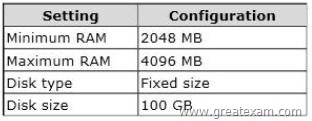
You need to recommend a solution to minimize the amount of disk space used for the snapshot of VM1. What should you do before you create the snapshot?
A. Convert diskl.vhd to a dynamically expanding disk.
B. Shutdown VM1.
C. Decrease the Minimum RAM.
D. Decrease the Maximum RAM.
Answer: B
Explanation:
Original answer is A.
But the correct answer is B.
Was the VM running when you took the snapshot?
Here is a big one. If the VM was running the VM can be restored to that previously running state. Thus all that occupied memory space must be saved as well. Now, not only is the disk (potentially) using more storage, but the SQL instance in the VM was set to use 2Gb of RAM, and all of that memory space must be saved as well.
QUESTION 224
Hotspot Question
Your network contains an Active Directory domain named contoso.com. Computer accounts for the marketing department are in an organizational unit (OU) namedDepartments\Marketing\Computers. User accounts for the marketing department are in an OU named Departments\Marketing\Users.
Marketing users can only log on to the client computers in the Departments\Marketing\Computers OU.
You need to apply an application control policy to all of the marketing users.
Which Group Policy Object (GPO) should you configure? To answer, select the appropriate GPO in the answer area.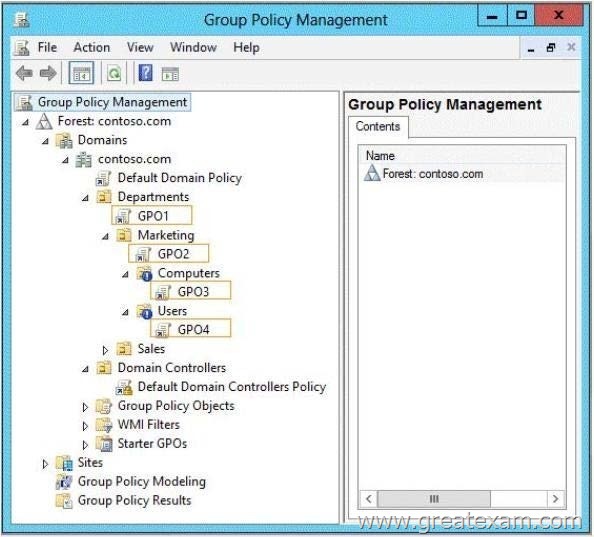
Answer: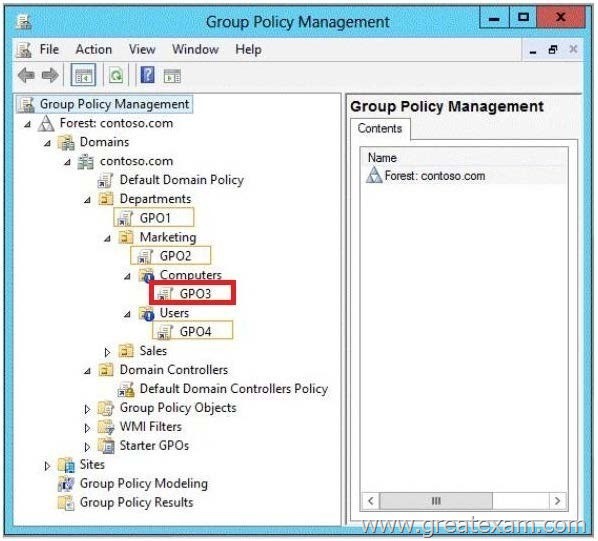
Explanation:
http://technet.microsoft.com/en-us/library/ee449496%28v=ws.10%29.aspx
QUESTION 225
Your network contains an Active Directory domain named contoso.com.
The domain contains a server named Server 1. Server1 runs Windows Server 2012 R2.
You need to create 3-TB virtual hard disk (VHD) on Server1.
Which tool should you use?
A. New-StorageSubsytemVirtualDisk
B. Share and Storage Management
C. Computer Management
D. File Server Resource Manager (FSRM)
Answer: C
Explanation:
For other questions to create a VHD (file) you can use computer management.
– Share and storage management (2008 only)
– New-storagesubsystemVirtualDisk (this is a virtual disk, NOT a virtual hard disk)
– Server Manager (you would use this to create virtual disks, not virtual hard disks)
QUESTION 226
Your network contains an Active Directory domain named contoso.com.
All servers run Windows Server 2012 R2.
When a domain user named User3 attempts to log on to a client computer named Client10, User3 receives the message shown in the following exhibit. (Click the Exhibit button.)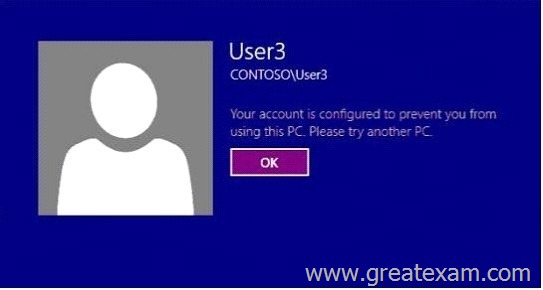
You need to ensure that User3 can log on to Client10.
What should you do?
A. From Active Directory Users and Computers, configure the Logon Workstations setting of User3.
B. On Client10, modify the Allow log on locally User Rights Assignment.
C. From Active Directory Users and Computers, configure the Personal Virtual Desktop property of User3.
D. On Client10, modify the Deny log on locally User Rights Assignment.
Answer: A
QUESTION 227
Your network contains an Active Directory domain named contoso.com. The domain contains a member server named Server1 and a domain controller named DC2. All servers run Windows Server 2012 R2. All domain controllers are configured as DNS servers. On Server1, you open Server Manager and you add DC2 as another server to manage. From Server Manager on Server2, you right-click DC2.
You need to ensure that when you right-click DC2, you see the option to run DNS Manager.
What should you do?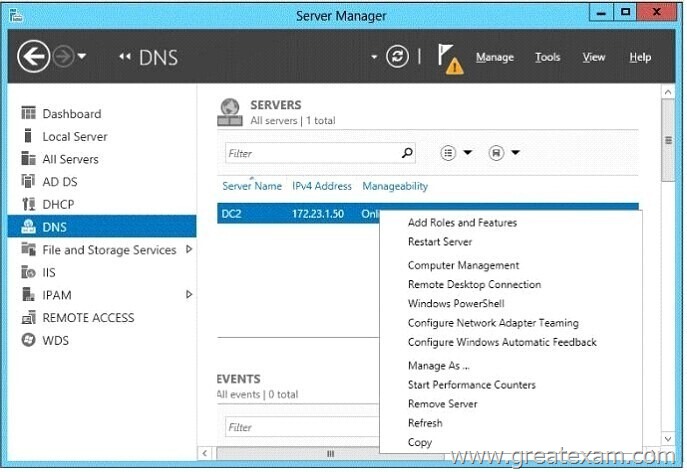
A. In the domain, add Server1 to the DNS Admins group.
B. On DC2 and Server1, run winrmquickconfig.
C. On DC2, install the Feature Administration Tools.
D. On Server1, install the Role Administration Tools.
Answer: D
Explanation:
If you have installed Windows Server 2012 R2 Roles and Features using PowerShell or remote server admin toolsor new multi server manager console, you will see that the management tools are missing from the server onwhich you just have enabled the role or feature. This is because Microsoft has provided more granular controlon what is installed on the Windows Server 2012 R2. As an administrator we have choice to include or not toinclude management tools while installing the Roles and Features we choose.
The goal for Windows Server 2012 administration is to manage remotely from Windows Server 2012 box thatwill act as the management host for all servers and will be accessed by all the IT administrators.
Typically, when a role is installed, the associated administration tools are also installed.
However, sometimes you simply need to add additional administrative tools.
http://technet.microsoft.com/en-us//library/cc731420%28v=ws.10%29.aspx http://windowsitpro.com/windows-server-2012/q-im-missing-some-windows-server- 2012administration-toolshow-do-i-add-them
QUESTION 228
You have a server named Server1 that runs Windows Server 2012 R2. A network technician installs a new disk on Server1 and creates a new volume. The properties of the new volume.
You need to ensure that you can restore files on volume D by using the Previous Versions tab. What should you do first?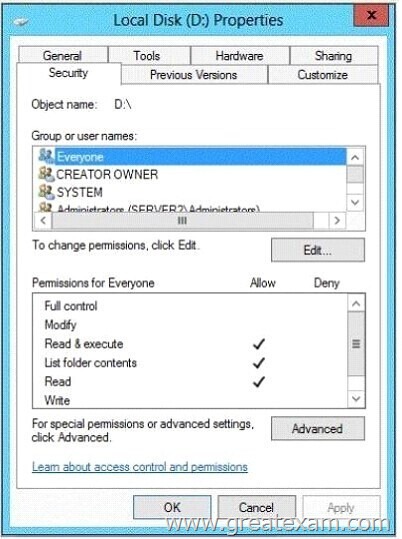
A. Convert the disk to a dynamic disk.
B. Format volume D.
C. Install the File Server Resource Manager role service.
D. Run the convert.exe command.
Answer: B
Explanation:
Shadow Copies for Shared Folders is activated at the volume level. The volume to be enabled for shadow copies must use NTFS and can be saved either on a basic disk or adynamic disk.
Assigning a drive letter to the volume is optional; an NTFS volume with shadow copy enabled can be mountedas a folder on another NTFS volume. You can only enable Shadow Copies of Shared Folders on a per-volume basis; that is, you cannot selectspecific shared folders and files on a volume to be copied or not copied. By default, the shadow copies will bestored on the volume that is being copied (the source volume). If you have more than one drive available onyour server, you should use a separate volume on another disk to store the shadow copies. This eliminates thepossibility that high input/output (I/O) load will cause shadow copies to be deleted. This is the recommendedconfiguration for heavily used file servers.
http://technet.microsoft.com/pt-pt/magazine/2006.01.rapidrecovery%28en-us%29.aspx http://technet.microsoft.com/en-us/library/cc875808.aspx
QUESTION 229
Your network contains an Active Directory domain named contoso.com. The domain contains a server named Server1. Server1 runs Windows Server 2012 R2 and has the Hyper-V server role installed. On Server1, you create and start a virtual machine named VM1.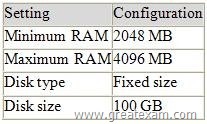
VM1 is configured as shown in the following table.
You plan to create a snapshot of VM1.
You need to recommend a solution to minimize the amount of disk space used for the snapshot of VM1.
What should you do before you create the snapshot?
A. Shut down VM1.
B. Decrease the Minimum RAM.
C. Decrease the Maximum RAM.
D. Configure VM1 to have a smaller virtual disk.
E. Convert disk1.vhd to a dynamically expanding disk.
F. Run the Stop-VM cmdlet.
G. Run the Resize-VHD cmdlet.
H. Run the Convert-VHD cmdlet.
Answer: AF
Explanation:
Virtual machine snapshots are file-based snapshots of the state, disk data, and configuration of a virtualmachine at a specific point in time.
You can take multiple snapshots of a virtual machine, even while it is running.
You can then revert the virtual machine to any of the previous states by Applying a snapshot to the virtualmachine.
Taking a snapshot of a VM is to in essence freeze the current state and make it a parent disk based on currentstate, and at the same time create a child disk to capture all subsequent changes. – See more at:
Snapshots require adequate storage space. Snapshots are stored as .avhd files in the same location at thevirtual hard disk. Taking multiple snapshots can quickly consume a large amount of storage space.
When you use Hyper-V Manager to delete a snapshot, the snapshot is removed from the snapshot treebut the .avhd file is not deleted until you turn off the virtual machine. Each snapshot introduces a parent-child dependency of the runtime environment when the snapshot wastaken, and over time a series of backups will results in a multi-level hierarchy of snapshots with nested
parentchilddependencies.
When you have systems that are required to be up and running 24/7 it basically throws away any use thatsnapshots have. It seems somewhat ridiculous that you have to bring a system down to delete the snapshotwhen one of the reasons you created the snapshot was to help reduce downtime in case something goeswrong. It is even more ridiculous that if you don’t power down
your system and wait for the vhd to merge,the snapshot will continue to grow until the system comes crashing down due to a lack of disk space!
(Microsoft does not recommend snapshots for production environments)
http://www.laneolson.ca/2009/10/09/hyper-v-snapshots-and-disk-space/ http://blogs.technet.com/b/yungchou/archive/2013/01/23/hyper-v-virtual-hard-disk-vhdoperations-explained.aspx
http://zoom.it/12u8
http://www.server-talk.eu/wp-content/uploads/article_2010-05-28_02.png
http://blogs.msdn.com/b/virtual_pc_guy/archive/2009/04/15/what-happens-when-i-delete- asnapshot-hyper-v.aspx
QUESTION 230
Your network contains an Active Directory domain named contoso.com.
The domain contains a server named Server1. Server1 runs Windows Server 2012 R2.
You need to create 3-TB virtual hard disk (VHD) on Server1.
Which tool should you use?
A. Diskpart
B. Server Manager
C. Computer Management
D. New-VirtualDisk
E. Share and Storage Management
F. File Server Resource Manager (FSRM)
G. New-StorageSubsytemVirtualDisk
H. New-StoragePool
Answer: AC
Explanation:
The New-VirtualDisk command creates a new virtual disk in the specified storage pool. New-VirtualDisk – Creates a new virtual disk in the specified storage pool. Although the new Server Manager UI in Windows Server 2012 R2 provides a very convenient and intuitiveworkflow to provision and manage Storage, interaction with PowerShell is required to access many of theadvanced features.
If I then create a simple 200GB Virtual Disk via the UI named VDiskSimpleUI, the resulting Virtual Diskleverages 8 columns and maintains 1 copy of the data. But when creating the Virtual Disk via PowerShell, Ican force the tripping across all nine of the disks and optimize performance. New-VirtualDisk -StoragePoolFriendlyName Pool01 -ResiliencySettingName Simple -Size 200GB – FriendlyNameVDiskSimplePS -ProvisioningType Fixed -NumberOfDataCopies 1
NumberOfColumns 9 And creating a mirrored 200GB Virtual Disk via the UI named VDiskMirrorUI produces a Virtual Disk with 4columns and 2 data copies. But with PowerShell, I can create a slightly different configuration, increasing thedata protection (and also the disk footprint):
New-VirtualDisk
-StoragePoolFriendlyName Pool01 -ResiliencySettingName Mirror -Size 200GB
-FriendlyNameVDiskMirrorPS -ProvisioningType Fixed -NumberOfDataCopies 3
NumberOfColumns 3.
http://blogs.technet.com/b/wincat/archive/2012/05/21/optimizing-windows-server-2012storage- managementvia-powershell-for-both-performance-and-resiliency.aspx http://technet.microsoft.com/en-us/library/hh848643%28v=wps.620%29.aspx
Microsoft 70-410 real exam questions are finished and summarized by our professional team, and corrected by senior IT experts. GreatExam Test 70-410 are the same as your actual test contents, all you need to do is studying the whole 70-410 real exam questions carefully before you take 70-410 exam. Then you can pass 70-410 exam and get certification easily.





